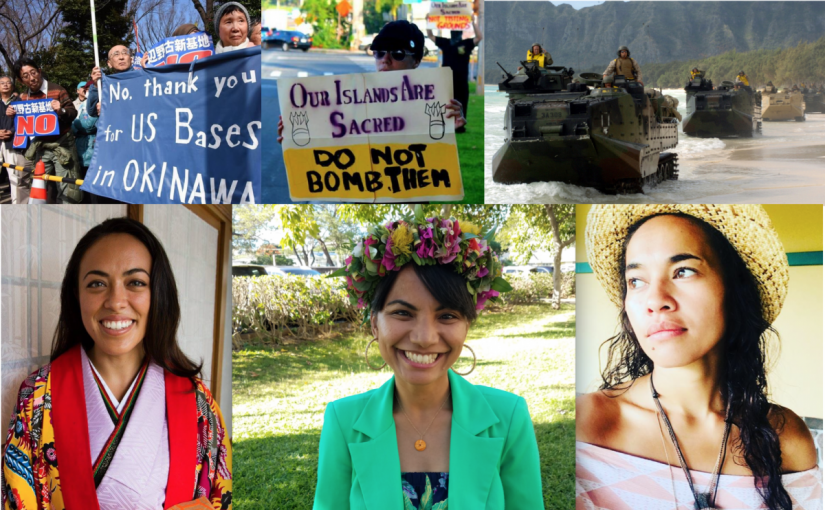“Oceania Rising:
Peace Pivot to the Pacific”
Pacific Northwest Speaking Tour,
February 17-21, 2019
VIDEO OF SEATTLE PRESENTATIONS (1:55)
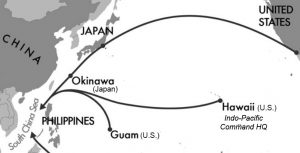
Three Indigenous women speakers from Okinawa, Guam, and Hawai’i are coming in February 2019 to the Pacific Northwest as the “Oceania Rising: Peace Pivot to the Pacific” tour, to discuss the growing movements against U.S. military bases, and for a demilitarized, nuclear-free, and independent Pacific.
Recent controversies in the Pacific have centered on the environmental, social, political, cultural, and economic effects of U.S. military bases. Kyle Kajihiro, board member of Hawai’i Peace and Justice, commented, “The bases make up about a quarter of the islands’ most valuable land, and make the islands vulnerable to toxic and radioactive contamination, damage from test bombing, jet crashes, unexploded ordnance, desecration of burials and other Indigenous sacred sites, potential foreign attack, and high social costs such as homelessness and sexual assault.”
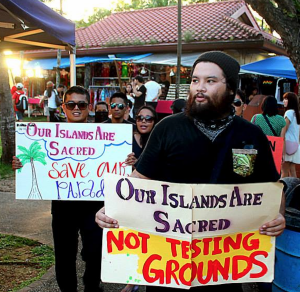 |
 |
Washington state is the location of major military bases that figure prominently in the Pentagon’s “Pivot to the Pacific” that is now redirecting U.S. military strategy from Europe to Asia, but few residents are aware of these concerns. Nor are we aware how the military presence prevents colonized Indigenous peoples from exercising their self-determination, particularly the Uchinaanchu (Okinawans) of Japanese-controlled Okinawa, the CHamoru (Chamorro) of the U.S. territory of Guåhan (Guam), and the Kanaka Maoli of Hawai’i. The three speakers have been members of Women’s Voices Women Speak (WVWS), “working toward a demilitarized, peaceful and nonviolent world.”
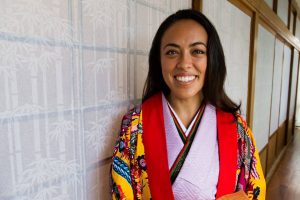 |
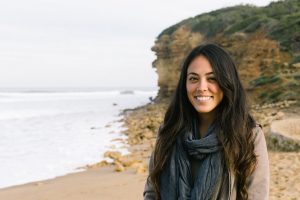 |
OKINAWA: Tina Grandinetti is a PhD candidate in Geography at RMIT University in Australia. In 2017, she traveled to Okinawa as a member of the WVWS delegation to the International Women’s Network Against Militarism gathering. As a biracial Uchinaanchu (Okinawan) woman who grew up in Hawaiʻi, she is interested in nourishing transnational solidarity against imperialism and towards decolonial futures. In Okinawa this week, the Japanese government is filling in a coral reef with sand to extend the new Henoko Marine base, destroying a highly biodiverse ecosystem that is home to fish, sea turtles, and dugong (manatees). Grandinetti said, “Discussions around the anti-base movement in Okinawa often revolve around the way that U.S.-Japan security agreements disproportionately burden Okinawa. But what’s missing in this framing is the fact that this mass movement is deeply rooted in a steadfast commitment to peace and nonviolence, not as an act of passivity, but as a radical refusal of war and militarism.”
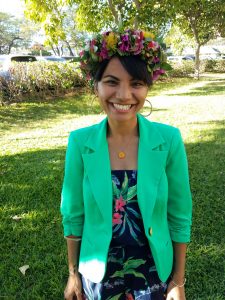 |
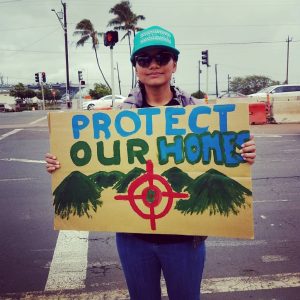 |
GUAM: Kisha Borja-Quichocho-Calvo is a PhD candidate in Political Science at the University of Hawai’i-Manoa, where Pacific Islander students have organized the Oceania Rising group. She is CHamoru from Guåhan (Guam) who has been very active in efforts to curb the military buildup there, and in cultural work and poetry. Borja-Quichocho-Calvo observed, “For over a century, the US military has occupied and contributed to the destruction of people’s health, of the environment, and of culturally-historically significant places in Oceania such as Guåhan (Guam). The contemporary US military buildup in the region isn’t something new to our community, and it isn’t something that is happening only on Guåhan…. When thinking about our future, we need to come together, peoples inside and outside Oceania, to continue creating and maintaining connections of solidarity and to change the normalized narrative of destruction and violence.”
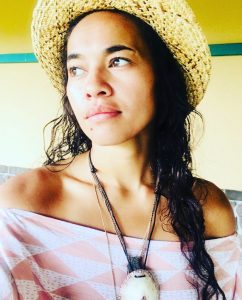 |
 |
HAWAI’I: Ruth Aloua is a Kanaka Maoli from the Kona District, Hawai’i. Her grandmother’s lineage binds her to the island Hawai’i and her grandfathers to Maui. She is a mahi’ai (farmer) for Malu ‘Āina Center for Nonviolent Education and Action and a kia’i loko (fishpond guardian) for Kaloko Fishpond. Her work extends to the peaks of Mauna a Wākea (defending Mauna Kea peak from the Thirty-Meter Telescope), to the plains of Pōhakuloa (a military training area on the slopes of Mauna Kea), into the deepest depths of the ocean to the realm of Kanaloa. She is an advocate for peace and justice fostering nonviolent interaction between people, land, water, ocean and air. Aloua commented, “Let me stand in the path of destruction if that is where the seed to peace lay. I’ll guard that seed for generations to let peace be the new way.”
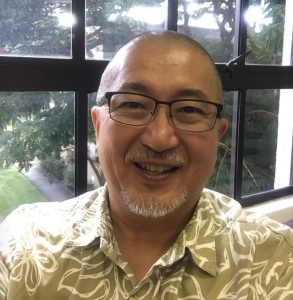
The events will be introduced via video by Kyle Kajihiro, former American Friends Service Committee (AFSC) staff member, Hawaiʻi Peace and Justice board member, founder of DMZ Hawai’i / Aloha ‘Aina, and PhD candidate in Geography at the University Hawai’i-Manoa.
The speakers have been brought initially to speak at The Evergreen State College’s “A People’s Geography of American Empire” program. The tour has the support of Hawai’i Peace and Justice, local chapters of Veterans for Peace, and other organizations. The “Oceania Rising: Peace Pivot to the Pacific” will be stopping at these venues:
Feb. 17 (Sun.) Port Townsend WA. Hosted by Sound Defense Alliance at the home of Larry Morrell and Laurie Riley.
Feb. 19 (Tues.) Olympia WA: The Evergreen State College (Purce Hall 1), 7-9 pm ($3 parking) Facebook event page Poster
Feb. 20 (Wed.) Portland OR: Peace House/Metanoia Peace Community (2116 NE 18th Ave), 7-9 pm. Hosted by Veterans for Peace chapter 72. Facebook event page
Feb. 21 (Thurs.) Nisqually Tribe WA: Nisqually Cultural Center, near Dupont WA.
Feb. 21 (Thurs.) Seattle WA: Centilia Cultural Center (1660 S. Roberto Maestas Festival St.), next to El Centro de la Raza / The Center for People of All Races, 7-9 pm. Hosted by Veterans for Peace chapter 92. Facebook event page Poster
MAPS & STATISTICS on Okinawa, Guåhan (Guam), and Hawai’i.
VIDEO OF SEATTLE PRESENTATIONS (1:55)
All events are free and open to the public.
For information and updates, see
Oceania Rising Tour
https://sites.evergreen.edu/oceaniarising
Contact email: Zoltan Grossman
zoltangrossman@gmail.com

